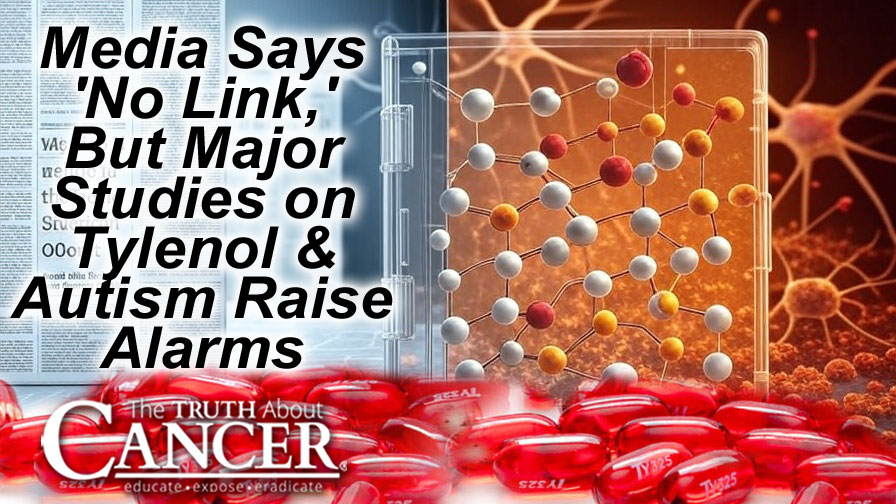Originally published on THE DEFENDER
President Donald Trump on Monday advised pregnant women to avoid Tylenol during pregnancy based on evidence that its active ingredient, acetaminophen, may be associated with an increased risk of neurological conditions, including autism and ADHD in children.
If women absolutely need to take acetaminophen while pregnant, they should take the smallest amount for the shortest duration, the White House said.
On the same day, the U.S. Food and Drug Administration (FDA) initiated a process to add warnings to Tylenol and other products that contain acetaminophen, and advised physicians and the public about the risks.
The announcement came as part of White House press conference during which administration officials unveiled efforts to examine all the possible causes of autism, including vaccines.
Even though the White House press release included links to studies by top research institutions, including Harvard, Johns Hopkins University and Mount Sinai, that identified a link between Tylenol used during pregnancy and autism, mainstream media attacked the claim as “unsubstantiated,” based on a “lack of evidence,” and reported that “science doesn’t back him up.”
Concerns about a possible link between acetaminophen use during pregnancy and autism are not new. In 2021, 91 scientists signed a consensus statement, published in the journal Nature Reviews Endocrinology, asserting that a growing body of research suggests that prenatal exposure to the drug may alter fetal development and increase the risks of neurodevelopmental, reproductive and urogenital disorders.
The scientists noted the drug had long been considered appropriate for pregnancy, but that new evidence showed it may be time to revisit the issue.
They called for “precautionary action” around the drug, suggesting women should be cautioned at the beginning of pregnancy to avoid the drug. Women who need to take the drug should “minimize exposure by using the lowest effective dose for the shortest possible time,” they concluded — the same recommendation issued by the administration yesterday.
When the consensus statement was issued in 2021, the American College of Obstetricians and Gynecologists (ACOG) issued a response insisting that Tylenol in pregnancy is safe. ACOG issued a similar statement again on Monday, following Trump’s announcement.
Use of Tylenol during pregnancy is widespread
A statement issued yesterday by the FDA echoed the Nature Reviews 2021 consensus statement. The FDA noted that although a causal relationship has not been definitively established, a considerable body of evidence and the “precautionary principle” may lead women to avoid using the drug during pregnancy, except in some scenarios where it is reasonable to take it.
Acetaminophen, the ingredient found in hundreds of prescription and over-the-counter medicines — including Tylenol products — is routinely recommended for fever reduction and the relief of mild to moderate pain.
Research shows that women are reluctant to use medications during pregnancy, but eight of 10 women take at least one drug while pregnant, with acetaminophen being the most commonly used medication — largely because women believe it has the lowest risk and greatest benefit.
In a sign that pregnant women take it for granted that Tylenol is safe, one study found that when asked about what drugs they take during pregnancy, many women didn’t even report acetaminophen use unless specifically asked.
Acetaminophen can be important for the treatment of high fever and severe pain that, left untreated, could potentially affect the developing fetus or the mother. However, studies suggest that many pregnant women use it without a strong indication — for things like chronic pain, back and knee pain, or headaches.
What has research found about the link between acetaminophen and neurological disorders?
Several major studies published in top journals examining the link between Tylenol and autism or attention-deficit/hyperactivity disorder (ADHD) have found an association, although some have found none.
No studies have identified a definitive causal link, and most call for more research.
Studies that have suggested a link include:
- A 2025 review by scientists from Harvard, Mount Sinai and other major institutions published in BMC Environmental Health that examined 46 previous studies and found that most studies — especially the high-quality studies – showed an association between prenatal acetaminophen use and ADHD, autism and other neurological disorders.
- A 2019 Johns Hopkins Bloomberg School of Public Health study published in JAMA Psychiatry that analyzed data from the Boston Birth Cohort, a 20-year study of early life factors influencing pregnancy and child development. The researchers found that exposure to acetaminophen in the womb may increase a child’s risk for ADHD or autism. They concluded, “Appropriate and immediate steps should be taken to advise pregnant women to limit acetaminophen consumption to protect their offspring’s neurodevelopment.”
- A 2019 observational study published in the American Journal of Epidemiology that analyzed data on nearly 9,000 children born between 1993-2005 to women enrolled in the Nurses’ Health Study II cohort. The researchers found a link between prenatal acetaminophen use and ADHD.
- A 2021 consensus statement that was based on a comprehensive review of experimental and epidemiological literature published between 1995-2020 in the PubMed scientific database. The authors noted that acetaminophen is an endocrine disruptor that can cross the blood-brain barrier and that they found evidence that it may alter neurodevelopment.
Based on the links evident in their review, they concluded that the “harm from continued inaction exceeds the harm that might arise from precautionary action,” and called for further research.
Some children can’t effectively metabolize acetaminophen
Not all studies have had the same findings. A population-based observational study in Sweden published in 2024 in the Journal of the American Medical Association found no link between use of acetaminophen and autism, ADHD or intellectual disability.
However, Tylenol researcher William Parker, Ph.D., disagrees with the conclusions from the Swedish study. He said the study actually shows that acetaminophen is linked to autism only when combined with other key risk factors.
In 2024, Parker and colleagues published a study in Clinical and Experimental Pediatrics that identified links between acetaminophen and autism when used prenatally and also when used during early life in susceptible babies and children.
Parker told The Defender that not all children have this susceptibility, but it has been known that some children can’t effectively metabolize the drug. This can trigger neurological disorders.
Parker pointed to other drugs, such as codeine, that were thought to be safe for children for more than 100 years. Today, its use in children is restricted in many countries because of safety concerns regarding genetic variations in how individuals metabolize the drug.
He said autism is the result of “a complex mix of genetics, epigenetics, and environment — all kinds of environmental exposures that make you more susceptible to autism.” For children who have difficulty metabolizing acetaminophen, the drug becomes more toxic and could trigger autism, he said.
Autism advocates call for more research on autism-vaccine connection
Advocates and researchers concerned about toxic exposures linked to autism said they were encouraged by the announcement, but that vaccines must also be studied
At the press conference, Trump suggested that vaccines and the childhood vaccination schedule have contributed to autism and to the onset of chronic disease in children.
He cited data showing a rapid increase in autism diagnoses in recent years and said, “Instead of attacking those who ask questions, everyone should be grateful for those who are trying to get the answers to this complex situation.”
Commenting on the announcement, Children’s Health Defense (CHD) CEO Mary Holland said she was encouraged that the administration is committed to uncovering the causes of the autism epidemic. However, she said:
“It is inconceivable that Tylenol and acetaminophen are the only causes. It is critical that the investigation of causes continue, especially into the 88% of autism cases plausibly characterized by developmental regression, where vaccines are the primary culprit, although acetaminophen may be a significant co-factor.
“‘Autism’ is a word for toxic exposures inducing brain injury; we must drill down on true causation and true representation of what is happening.”
‘This is brain damage’ due to infant exposure to aluminum in vaccines’
Christopher Exley, Ph.D., a biologist and leading expert on aluminum toxicity, said that he watched the press conference and “it was quite unbelievable to hear the President say that we do not want aluminium in vaccines and that they are going to remove it from vaccines.”
No press members asked any questions about those statements, he added. “Such statements dwarf anything said about Tylenol and autism. The aluminium industry will be worried and will pull any strings they have to make sure that there are only ‘words’ and no actions.”
Exley noted that Tylenol also contains aluminum. He said it’s possible that the greater aluminum load from taking the drug is associated with a greater risk of the disorder. However, he said the focus on Tylenol was a distraction from the more important issue
“Tylenol is their way of looking like they are addressing the issue of autism without mentioning aluminium per se.”
Exley said he believes Tylenol exposure in pregnancy alone can’t explain severe, debilitating autism. “This is brain damage most likely due to infant exposure to aluminium in vaccines and infant formula.”
CHD Chief Scientific Officer Brian Hooker similarly argued in an op-ed, “even if acetaminophen is necessary for autism to develop, it is not fully sufficient to cause the disorder alone. The research clearly points to an oxidative stress component or components that differentiate between infants who develop autism after acetaminophen exposure versus those infants who do not.”
Sayer Ji, chairman of the Global Wellness Forum, said that the warning about Tylenol in pregnancy was a historic first step.
“Today’s announcement is a historic break from decades of denial. The government has finally admitted what parents always knew: autism is being driven by environmental and pharmaceutical exposures, not just genes.
“By warning about Tylenol in pregnancy, for infants and children, and implicating vaccines in this multifactorial catastrophe, the White House has shattered the wall of silence that protected pharmaceutical interests for decades.”



















Also, You will find aluminum in infant formulas and infant foods…
https://www.momsacrossamerica.com/baby_formula_toxic_metals_results_released
What a great article, many thanks for your erudition. This is a hot topic right now and as per usual, the globalist owned and driven MsM has done its very best to obfuscate, misinterpret, deny and divert the core message. That being we are living through an epidemic growth of Autism and spectrum disorders AND that finally people in official high places have started to ask the right questions. I have shared this with everyone who was struggling to understand the detail but who were all-too-easily fooled into believing the global-wide hammed ‘hit piece’ on the Trump administration (and RFK) announcement last week.